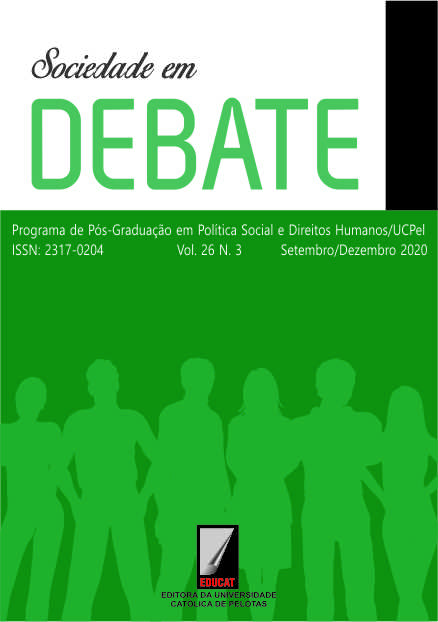Familiarizing non-familiarity: alterity and affective dimension in social representations of roma people
DOI:
https://doi.org/10.47208/sd.v26i3.2699Keywords:
Alteridade, Ciganos, Dimensão afetiva, Representações SociaisAbstract
The study aimed to analyse the social representations of Roma people among non-Roma in the Greater Metropolitan Region of Vitória/Brazil. With data collection done through questionnaire, 300 people, aged between 10 and 25 years old, participated in the study. The results, analysed through factorial analysis of correspondence and cluster analysis, showed four sets of representations about Roma people – “They are like those others,” “I distrust and they bother me,” “I do not know them, but I am afraid,” and “I am fascinated by that different culture” – and also three different affective positions, oriented by the discomfort, threat and fascination. The complexity of the process of familiarization in the construction of social representations is discussed in its interface with the dynamics of alterity.
Downloads
References
AIKINS, Ama De-Graft. Familiarising the unfamiliar: cognitive polyphasia, emotions and the creation of social representations. Papers on Social Representations, v. 21, n. 1, p. 7.1-7.28, 2012. Disponível em: http://psr.iscte-iul.pt/index.php/PSR/article/view/341. Acesso em: 09 jan. 2020.
BAIERL, Luzia Fátima. Medo social – da violência invisível ao invisível da violência. São Paulo: Cortez, 2004.
BAUMAN, Zygmunt. Estranhos à nossa porta. Rio de Janeiro: Zahar, 2017.
BONOMO, Mariana et al. Temor e fascínio: dimensão afetiva e representações sociais de ciganos entre população não cigana. Psicologia e Saber Social, v. 1, n. 2, p. 245-264, 2012. Disponível em: https://doi.org/10.12957/psi.saber.soc.2012.4903. Acesso em: 09 jan. 2020.
BONOMO Mariana, et al. Mulheres ciganas: medo, relações intergrupais e confrontos identitários. Universitas psychologica, v. 10, n. 3, p. 745-758, 2011. Disponível em: https://doi.org/10.11144/javeriana.upsy10-3.mcmr. Acesso em: 09 jan. 2020.
BREAKWELL, Glynis Marie. Integrating paradigms, methodological implications. In: BREAKWELL, Glynis Marie; CANTER, David Victor (Eds.). Empirical Approaches to Social Representations. Londres: Clarendon Press-Oxford, 1993, p. 180-201.
BYE, Hege et al. Stereotypes of Norwegian social groups. Scandinavian Journal of Psychology, v. 55, n. 5, p. 469–476, 2014. Disponível em: https://doi.org/10.1111/sjop.12141. Acesso em: 09 jan. 2020.
CAMPOS, Pedro Humberto Faria; ROUQUETTE, Michel-Louis. Abordagem estrutural e componente afetivo das representações sociais. Psicologia: Reflexão e Crítica, v. 16, n. 3, p. 435-445, 2003. Disponível em: http://dx.doi.org/10.1590/S0102-79722003000300003. Acesso em: 09 jan. 2020.
CARVALHO, Nayara Chagas et al. Representações sociais dos ciganos em Sergipe: contato e estereótipos. Psicologia e Saber Social, v. 1, n. 2, p. 232-244, 2012. Disponível em: https://doi.org/10.12957/psi.saber.soc.2012.4902. Acesso em: 09 jan. 2020.
DELUMEAU, Jean. Medos de ontem e de hoje. In: NOVAES, Adauto (Ed.). Ensaios Sobre o Medo. São Paulo: Editora Senac-Sesc, 2007, p. 39-52.
DELUMEAU, Jean. A história do medo no ocidente, 1300-1800: Uma cidade sitiada. São Paulo: Companhia das Letras, 2009.
DOISE, Willem. L’ancrage dans les études sur les représentations sociales. Bulletin de Psychologie, v. 45, n. 405, p. 189-195, 1992.
DOISE, Willem; CLÉMENCE, Alain; LORENZI-CIOLDI, Fabio. Représentations sociales et analyses des données. Grenoble: Presses Uiversitaires de Grenoble, 1992.
FONTANELLA, Lara; VILLANO, Paola; DI DONATO, Marika. Attitudes towards Roma people and migrants: A comparison through a Bayesian multidimensional IRTodel. Quality and Quantity, v. 50, p. 471–490, 2016. Disponível em: https://doi.org/10.1007/s11135-014-0158-9. Acesso em: 09 jan. 2020.
FREITAS, Maria Ester; DANTAS, Marcelo. Medos sociais dos brasileiros. Organizações & Sociedade, v. 21, n. 68, p. 893-910, 2014. Disponível em: http://dx.doi.org/10.1590/S1984-92302014000100008. Acesso em: 09 jan. 2020.
GLASSNER, Barry. Cultura do medo. São Paulo: Francis, 2003.
GIL, A. C. Métodos e técnicas de pesquisa social. 6 ed. São Paulo: Atlas, 2008.
HOWARTH, Caroline. A social representation is not a quiet thing: Exploring the critical potential of social representations theory. British journal of social psychology, v. 45, n. 1, p. 65-86, 2006. Disponível em: https://doi.org/10.1348/014466605X43777. Acesso em: 09 jan. 2020.
JAHODA, Gustav. Images of savages: ancient roots of modern prejudice in Western culture. Nova Iorque e Londres: Routledge, 1999.
JODELET, Denise. A alteridade como produto e processo psicossocial. In: ARRUDA, Angela (Ed.). Representando a alteridade. Petrópolis: Vozes, 2002, p. 47-67.
JODELET, Denise. Loucuras e representações sociais. Petrópolis: Vozes, 2005. (Obra originalmente publicada em 1989).
JOFFE, Hélène. Degradação, desejo e ‘o outro’. In: ARRUDA, Angela (Ed.). Representando a alteridade. Petrópolis: Vozes, 2002, p. 109-128.
JOFFE, Hélène. Identity, self-control and risk. In: MOLONEY, Gail; WALKER, Iain (Eds.). Social representations and identity: content, process, and power. Nova Iorque: Palgrave Macmillan, 2007, p. 197-213.
JOVCHELOVITCH, Sandra. Representações sociais e polifasia cognitiva: notas sobre a pluralidade e sabedoria da razão em Psicanálise, sua Imagem e seu Público. In: OLIVEIRA, Angela Maria; SANTOS, Maria de Fátima de Souza; TRINDADE, Zeidi Araujo (Eds.). Teoria das representações sociais: 50 anos. Brasília: Technopolitik, 2011, p. 159-176.
KALAMPALIKIS, Nikos; HAAS, Valérie. More than a theory: A new map of social thought. Journal for the Theory of Social Behaviour, v. 38, n. 4, p. 449–459, 2008. Disponível em: https://doi.org/10.1111/j.1468-5914.2008.00381.x. Acesso em: 09 jan. 2020.
KENDE, Anna; HADARICS, Martón; LÁŠTICOVÁ, Barbara. Anti-Roma attitudes as expressions of dominant social norms in Eastern Europe. International Journal of Intercultural Relations, v. 60, p. 12-27, 2017. Disponível em: https://doi.org/10.1016/j.ijintrel.2017.06.002. Acesso em: 09 jan. 2020.
LEBART, Ludovic ; MORINEAU, Alain ; BECUE, Monique. SPAD-T - Manuel de l’utilisateur. Saint Mondé, France: Cisia - Centre International de statistique et d’informatique appliquées, 1994.
LIMA, Marcus Eugênio Oliveira; FARO, André; SANTOS, Mayara Rodrigues dos. A desumanização Presente nos Estereótipos de Índios e Ciganos. Psicologia: Teoria e Pesquisa, v. 32, n. 1, p. 219-228, 2016. Disponível em: http://dx.doi.org/10.1590/0102-37722016012053219228. Acesso em: 09 jan. 2020.
MACLAUGHLIN, Jim. Racism, ethnicity and multiculturalism in contemporary Europe: A review essay. Political Geography, v. 17, n. 8, p. 1013–1024, 1998. Disponível em: https://doi.org/10.1016/S0962-6298(98)00001-8. Acesso em: 10 jan. 2020.
MARINARO, Isabella Clough. Between surveillance and exile: Biopolitics and the Roma in Italy. Bulletin of Italian Politics, v. 1, n. 2, p. 265–287, 2009.
MARKOVÁ, Ivana. The Self/Other as an Epistemological Thema: A Commentary on Smith, O’Connor and Joffe, and on Moloney, Gamble, Hayman and Smith. Papers on social representations, v. 24, n. 2, p. 3.1-3.12, 2015. Disponível em: http://psr.iscte-iul.pt/index.php/PSR/article/view/117. Acesso em: 10 jan. 2020.
MOONEN, Frans. Anticiganismo: Os Ciganos na Europa e no Brasil. Recife: Digital Revista e Atualizada, 2011.
MORANT, Nicola; ROSE, Diana. 2002. Loucura, multiplicidade e alteridade. In: ARRUDA, Angela (Ed.). Representando a alteridade. Petrópolis: Vozes, 2002, p. 129-148.
MORERA, Jaime Alonso Caravaca et al. Theoretical and methodological aspects of social representations. Texto & Contexto – Enfermagem, v. 24, n. 4, p. 1157-1165, 2015. Disponível em: http://dx.doi.org/10.1590/0104-0707201500003440014. Acesso em: 10 jan. 2020.
MOSCOVICI, Serge. Pensée stigmatique et pensée symbolique: deux formes élémentaires de la pensée sociale. In: GARNIER, Catherine (Ed.). Les Formes de la Pensée Sociale. Paris: PUF, 2002, p. 21-53.
MOSCOVICI, S. A psicanálise, sua imagem e seu público. Petrópolis: Vozes, 2012. (Obra originalmente publicada em 1961).
MOSCOVICI, Serge. O fenômeno das representações sociais. In: DUVEEN, Gerard (Ed.). Representações sociais: investigações em Psicologia Social. Petrópolis: Vozes, 2010, p. 29-109. (Obra originalmente publicada em 2000).
O’CONNOR, Cliodhna. Embodiment and the construction of social knowledge: Towards an integration of embodiment and Social Representations Theory. Journal for the Theory of Social Behaviour, v. 47, n. 1, p. 2–24, 2017. Disponível em: https://doi.org/10.1111/jtsb.12110. Acesso em: 10 jan. 2020.
PÉREZ, Juan Antonio; MOSCOVICI, Serge; CHULVI, Berta. The taboo against group contact: hypothesis of gypsy ontologization. British Journal of Social Psychology, v. 46, n. 2, p. 249-272, 2007. Disponível em: https://doi.org/10.1348/014466606X111301. Acesso em: 10 jan. 2020.
PHILOGÈNE, Gina. Social Representations of Alterity in the United States. In: MOLONEY, Gail; WALKER, Iain (Eds.). Social representations and identity: content, process, and power. Nova Iorque: Palgrave Macmillan, 2007, p. 31-42.
PIVETTI, Monica; MELOTTI, Giannino; BONOMO, Mariana. An exploration of social representations of the Roma woman in Italy and Brazil: Psychosocial anchoring to emotional reactions. International Journal of Intercultural Relations, v. 58, p. 12-22, 2017. Disponível em: https://doi.org/10.1016/j.ijintrel.2017.03.001. Acesso em: 10 jan. 2020.
POMBO-DE-BARROS, Carolina Fernandes; ARRUDA, Angela Maria Silva. Afetos e representações sociais: contribuições de um diálogo transdisciplinar. Psicologia: Teoria e Pesquisa, v. 26, n. 2, p. 351-360, 2010. Disponível em: http://dx.doi.org/10.1590/S0102-37722010000200017. Acesso em: 10 jan. 2020.
POWELL, R.; LEVER, J. Europe’s perennial ‘outsiders’: A processual approach to Roma stigmatization and ghettoization. Current Sociology, v. 65, n. 5, p. 680-699, 2017. Disponível em: https://doi.org/10.1177/0011392115594213. Acesso em: 06 jan. 2020.
RIME, Bernard. La dimensione sociale delle emozioni. Bologna: Il Mulino, 2008.
ROSE, Diana. Television, madness and community care. Journal of Community & Applied Social Psychology, v. 8, n. 3, p. 213-228, 1998. Disponível em: https://doi.org/10.1002/(SICI)1099-1298(199805/06)8:3<213::AID-CASP449>3.0.CO;2-C. Acesso em: 10 jan. 2020.
SANTOS, Mayara Rodrigues; LIMA, Marcus Eugênio Oliveira. Processos de desumanização dos ciganos em Sergipe. Clínica & Cultura, v. 1, n. 1, p. 83-95, 2012. Disponível em: https://seer.ufs.br/index.php/clinicaecultura/article/view/639/0. Acesso em: 10 jan. 2020.
SIGONA, Nando. Locating ‘The Gypsy Problem’. The Roma in Italy: Stereotyping, Labelling and ‘Nomad Camps’. Journal of Ethnic and Migration Studies, v. 31, n. 4, p. 741-756, 2005. Disponível em: https://doi.org/10.1080/13691830500109969. Acesso em: 10 jan. 2020.
SMITH, Nicholas; O’CONNOR, Cliodhna; JOFFE, Hélène. Social representations of threatening phenomena: the self-other thema and identity protection. Papers on Social Representations, v. 24, n. 2, p. 1.1–1.23, 2015. Disponível em: http://psr.iscte-iul.pt/index.php/PSR/article/view/115. Acesso em: 10 jan. 2020.
SOUZA, L. Processos de categorização e identidade: solidariedade, exclusão e violência. In: SOUZA, L.; TRINDADE, Z. A. (Orgs.). Violência e exclusão: convivendo com paradoxos. São Paulo: Casa do Psicólogo, 2004, p.57-74.
TEIXEIRA, R. C. História dos ciganos no Brasil. Recife: Núcleo de Estudos Cigano, 2008.
TILEAGĂ, Cristian. Representing the ‘Other’: A discursive analysis of prejudice and moral exclusion in talk about Romanies. Journal of Community & Applied Social Psychology, v. 16, n. 1, p. 19-41, 2006. Disponível em: https://doi.org/10.1002/casp.846. Acesso em: 10 jan. 2020.
VILLANO, P., et al. Stereotyping Roma people in Italy: IRT models for ambivalente prejudice measurement. International Journal of Intercultural Relations, v. 57, p 30-41, 2017. Disponível em: https://doi.org/10.1016/j.ijintrel.2017.01.003. Acesso em: 10 jan. 2020.
WOORTMANN, Klaas. O selvagem e a História. Heródoto e a questão do Outro. Revista de Antropologia, v. 43, n. 1, p. 13-59, 2000. Disponível em: http://dx.doi.org/10.1590/S0034-77012000000100002. Acesso em: 10 jan. 2020.
Downloads
Published
How to Cite
Issue
Section
License
Copyright (c) 2020 Mariana Bonomo, Julia Alves Brasil, Grecy Kelle de Andrade Cardoso, Camila Nogueira Bonfim Duarte, Lucas Có Barros Duarte, Amandha Gyselle Martins Nascimento, Jéssica Maria Gomes de Faria

This work is licensed under a Creative Commons Attribution-NonCommercial 4.0 International License.



